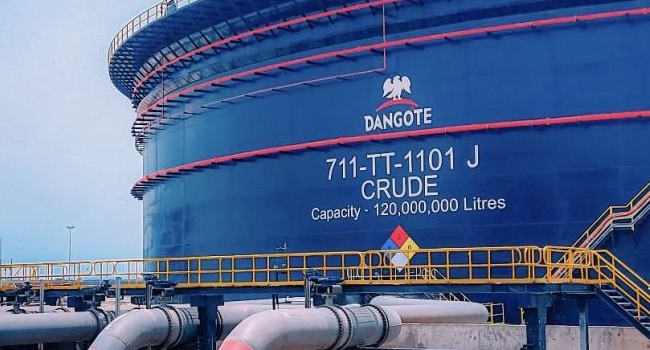Vice-president of Dangote Industries Limited, Edwin Devakumar, has said that the refinery and other local refiners have been unable to secure enough crude oil supplies despite the federal government’s plan to sell crude priced in the local currency.
To address challenges in accessing foreign currency, FG in July said it would sell crude priced in naira to local refineries for an initial six months starting in October.
Nigeria officially commenced the sale of crude oil to refineries in naira on October 1, forcing Dangote refinery to focus on local supply.
The refinery received four cargoes of crude oil from the NNPC under the naira-for-crude sale agreement recently, but it still looks to the US for crude.
“We need 650,000 barrels per day, (state oil firm NNPC Ltd) agreed to give a minimum of 385,000 bpd but they are not even delivering that,” said Edwin Devakumar, head of the Dangote refinery told Reuters on Friday.
Dangote Refinery built in Lagos aims to compete with European refiners when operating at full capacity, however, it has struggled to secure sufficient crude supplies to run optimally.
While Devakumar declined to give specific figures, he described deliveries from NNPC under the scheme as “peanuts”.
Still, Dangote is the only one of eight operational refineries in Nigeria to have benefited from the naira-denominated crude sale arrangement, said Mathins Obaze, an acting executive director of the Crude Oil Refinery-owners Association of Nigeria (CORAN), a trade group of refiners.
“Members are still unable to access crude in naira and are currently engaging the government for a resolution,” Obaze said.
The reason for the shortfall was not immediately clear. NNPCL did not respond to a request for comment.
The Dangote refinery in August urged the oil regulator, the Nigerian Upstream Petroleum Regulatory Commission (NUPRC) to enforce a rule that compels oil producers to supply local refineries.
In an August statement, Dangote Refinery accused the NUPRC of failing to enforce the Domestic Crude Supply Obligation (DCSO), a provision that requires crude oil producers to supply domestic refiners with a portion of their production.
“Our concern has always been that the NUPRC is pushing, but the international oil companies are not following the instructions,” said Anthony Chiejina, a Dangote Refinery spokesperson in the statement.
“Consequently, we often purchase the same Nigerian crude from international traders at an additional $3-$4 premium per barrel which translates to $3-$4 million per cargo,” he said.
Responding to the allegation, however, in a statement, the NUPRC said some producers were experiencing operational challenges while others had pledged most of their output to oil traders who financed drilling. It also said forcing them to raise their supply would violate their contracts.
Dangote, with a current capacity of 425,000 bpd and a year-end target of 85% operational capacity, has turned to international markets for supplies.
The report quoting trade sources and shipping data said NNPCL purchased two million barrels of U.S. WTI Midland crude on Wednesday, its first U.S. crude purchase since August.
Meanwhile, NNPCL is pursuing new markets for its crude oil. On Wednesday, the company was in London seeking term customers for its new Utapate crude oil grade.





